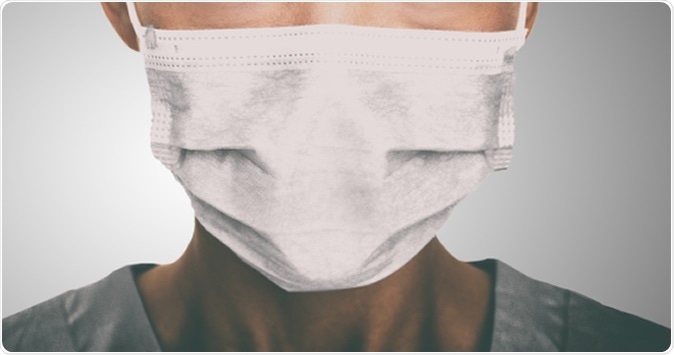According to a new analysis, air pollution is associated with more deaths in the currently raging COVID-19 pandemic. A new American study from researchers at Department of Biostatistics, Harvard T.H. Chan School of Public Health, Boston, showed that a single unit increase in particle pollution levels in the air could raise the risk of death by 15 percent and that before this pandemic if the air was cleaner, it could have saved many lives.

COVID-19 PM2.5 - A national study on long-term exposure to air pollution and COVID-19 mortality in the United States. Image Credit: Maridav / Shutterstock
What was this study about?
Several studies in the recent past have spoken about climate change and levels of air pollution and its connection with increased risk of death. Many nations have poor air quality associated with diseases, including not only those of lungs but also heart disease and other problems. With the current pandemic of COVID-19 killing tens of thousands of individuals across the world and infecting nearly over 1.5 million, the comparison between poor air quality causing deaths and deaths due to the pandemic is now increasingly important.
The team wrote that it is speculated that COVID-19 could kill “100,000 and 240,000 Americans”. They also add that several diseases that raise the risk of deaths due to COVID-19 are the same are those that raise the risk of deaths due to air pollution. They explored “whether long-term average exposure to fine particulate matter (PM2.5) increases the risk of COVID-19 deaths in the United States,” in this study.
PM2.5 (particles with a diameter of 2.5 micrometers or less): these particles are so small they can get deep into the lungs and into the bloodstream. There is sufficient evidence that exposure to PM2.5 over long periods (years) can cause adverse health effects.
What was done?
For this study, the team of researchers gathered information from around 98 percent of the American population living in around 3,000 counties across the United States. The data was gathered until the 4th of April 2020. They used mathematical models such as “zero-inflated negative binomial mixed models” to compare deaths due to COVID-19 and long-term exposure to air pollution particles PM2.5. Other factors such as the scale of the population, weather, socioeconomic and behavioral parameters (such as obesity and smoking), hospital beds, number of individuals tested for infection, etc. were also taken into account while making the comparisons. Correlation between counties in the same state was also made, wrote the researchers.
What was found?
Results revealed that an increase of only 1 μg/m3 in PM2.5 led to a 15 percent rise in COVID-19 death rates. The rates ranged between 5 and 25 percent. The authors added, “Results are statistically significant and robust to secondary and sensitivity analyses.”
Rachel Nethery, one of the study authors, said, “Previous work showed that air pollution exposure dramatically increased the risk of death from [the] SARS [coronavirus] during the 2003 outbreak. So we think our results here are consistent with those findings.”
Co-author, Xiao Wu said, “This information can help us prepare by encouraging populations [with high pollution exposure] to take extra precautions and allocate extra resources to reduce the risk of poor outcomes from COVID-19. It is likely that COVID-19 will be a part of our lives for quite a long time, despite our hope for a vaccine or treatment. In light of this, we should consider additional measures to protect ourselves from pollution exposure to reduce the COVID-19 death toll.”
Conclusions and implications
The authors concluded that exposure to PM2.5 over the long term raises the risk of COVID-19 death. They wrote that the increase in the risk of death was “20 times that observed for PM2.5 and all-cause mortality”. The team wrote that this shows that there is a need for enforcement of air pollution regulations in order to protect the lives of humans both before as well as after the crisis arisen from the COVID-19 pandemic. They added that the US Environmental Protection Agency suspended its enforcement of environmental laws on the 26th of March this year, and this could be detrimental. Due to the lockdowns and the reduced number of vehicles on the roads, the air quality seems to have improved temporarily, they wrote. However, the laws need to be in place for continued maintenance and improvement of the air quality.
The team writes that this study is important as it emphasizes the need for addressing the modifiable risk factors associated with COVID-19 deaths in the United States. They explain, however, that the limited testing for COVID-19 at present was a hurdle in their analysis.
The authors wrote in conclusion, “The results of this study also underscore the importance of continuing to enforce existing air pollution regulations during the COVID-19 crisis. Based on our result, we anticipate a failure to do so can potentially increase the COVID-19 death toll and hospitalizations, further burdening our healthcare system and drawing resources away from COVID-19 patients.”
Important Notice
medRxiv publishes preliminary scientific reports that are not peer-reviewed and, therefore, not be regarded as conclusive, guide clinical practice/health-related behavior, or treated as established information.
Journal reference:
Exposure to air pollution and COVID-19 mortality in the United States. Xiao Wu, Rachel C. Nethery, Benjamin M. Sabath, Danielle Braun, Francesca Dominici. medRxiv 2020.04.05.20054502; doi: https://doi.org/10.1101/2020.04.05.20054502